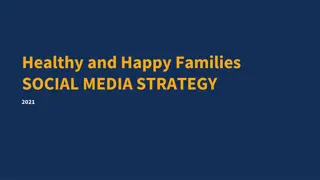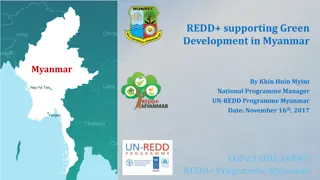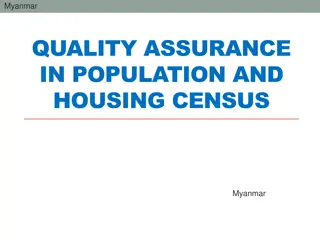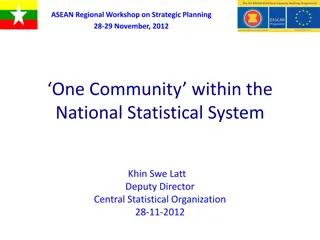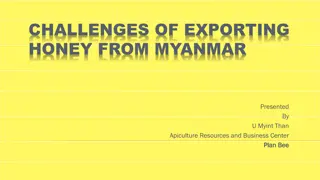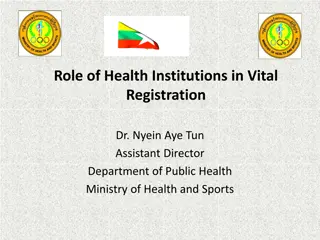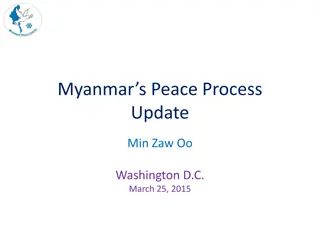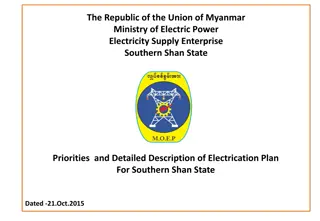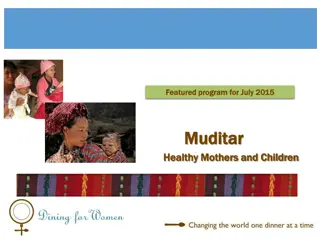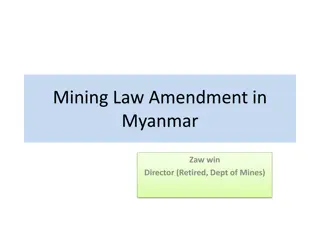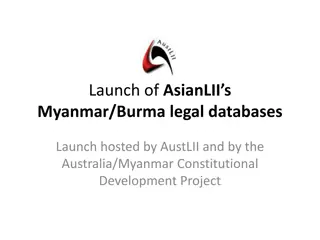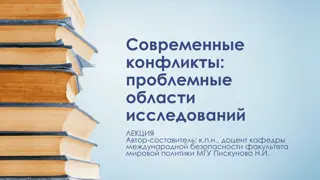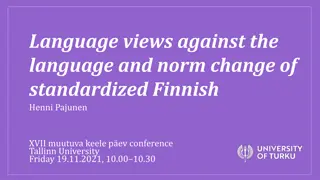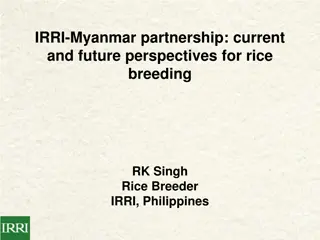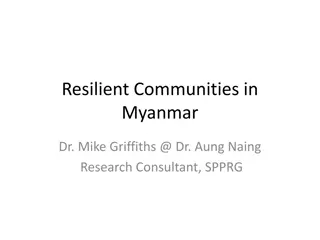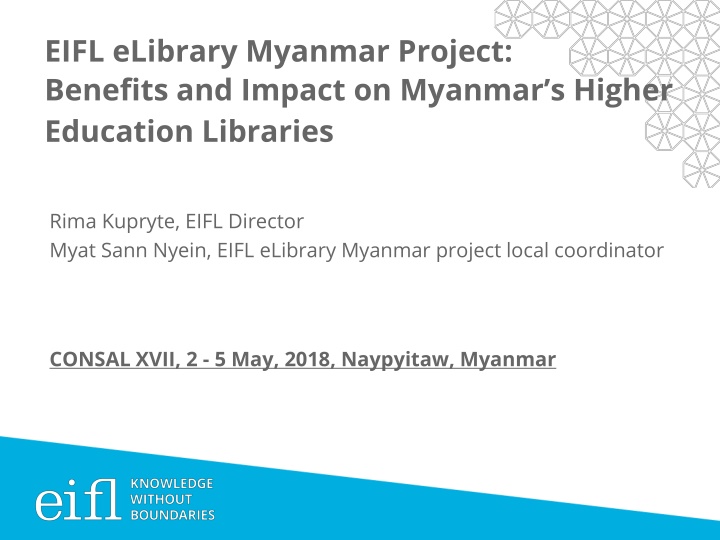
Innovative Impact of EIFL eLibrary Myanmar Project on Higher Education
Explore how the EIFL eLibrary Myanmar Project has revolutionized higher education in Myanmar by enhancing access to e-resources, building digital skills, and fostering collaboration among universities and libraries. Overcoming challenges, the project has achieved remarkable results in transforming teaching and learning practices.
Download Presentation

Please find below an Image/Link to download the presentation.
The content on the website is provided AS IS for your information and personal use only. It may not be sold, licensed, or shared on other websites without obtaining consent from the author. If you encounter any issues during the download, it is possible that the publisher has removed the file from their server.
You are allowed to download the files provided on this website for personal or commercial use, subject to the condition that they are used lawfully. All files are the property of their respective owners.
The content on the website is provided AS IS for your information and personal use only. It may not be sold, licensed, or shared on other websites without obtaining consent from the author.
E N D
Presentation Transcript
EIFL eLibrary Myanmar Project: Benefits and Impact on Myanmar s Higher Education Libraries Rima Kupryte, EIFL Director Myat Sann Nyein, EIFL eLibrary Myanmar project local coordinator CONSAL XVII, 2 - 5 May, 2018, Naypyitaw, Myanmar
A project of EIFL (Electronic Information for Libraries). EIFL s vision: A world in which everyone has the knowledge they need to reach their full potential.
Launched in December 2013 Main aim to help improve higher education in Myanmar by increasing availability and usage of e- resources in teaching and learning. Started small 2 universities: University of Mandalay & University of Yangon. Rapid expansion reaching 13 universities with 200,000 students by 2018.
List of partner universities Joined in 2013 University of Mandalay University of Yangon (including Universities Central Library) Joined in 2015 East Yangon University West Yangon University Joined in 2018 Mandalay Technological University University of Computer Studies, Mandalay University of Computer Studies, Yangon Yangon Technological University Mawlamyine University Sittwe University Joined in 2014 Dagon University Yadanabon University Yangon University of Economics
Challenges Human capacity Role of librarians ignored for five decades. Librarians, faculty, students very poor digital skills. No experience using e- resources. Rote learning. Cooperation among libraries rare. Infrastructure University & library infrastructure decayed. Few universities had internet. Low bandwidth 2 Mbps / second. Difficulties getting static IP addresses. No online presence e.g. websites.
What did we do? Negotiated discounted & free access to high-quality academic e-resources. Built capacity to use e-resources. Raised awareness about availability and benefits of e- resources. Encouraged faculty to embed e-resources in curriculum. Increased skills of librarians in IT & information literacy. Encouraged librarians to build close links with faculty. Developed a library consortium to sustain & grow the project. Created institutional open access repositories to make local research globally visible.
Results: Excellent terms of use All e-resources available on unlimited, simultaneous user basis. Access 24/7 to faculty and students anywhere on campus. Remote off-campus access to EBSCO database via username and password. Walk-in users from other universities allowed to use licensed e-resources in libraries of partner universities. 55 high quality e- resources. Free access to 27 of these. 25,000 full-text scholarly journals. 265,000 academic e-books.
EBSCO search box plus customized interface with institutional branding
Results: Increased skills & capacity of librarians ALL librarians at seven partner universities have basic computer and internet skills. Each library has a team of advanced librarians who have capacity to train others in the use of e-resources and information literacy. Libraries provide regular ICT, information literacy and e- resources training for faculty and students. Library leaders are confident in raising issues with university management. Libraries are reviewing their organizational charts and job descriptions.
Result: Good collaboration with faculty From 2014 2017 over 200,000 full-text downloads of journal articles and book chapters. Faculty conduct classes in the library. Faculty set research assignments that require use of the library and e-resources. Librarians are invited to classes to introduce e- resources that are relevant to particular subjects.
Result: Upgrades in infrastructure Universities, libraries have wi-fi. New high-speed fiber optic cables. Universities have static IP addresses. All universities have websites. Investment in library furniture, computer labs, training rooms, workstations, air conditioning.
Result: New and improved library services Increased opening hours (some over weekends & holidays). Library induction for new students. Basic IT & e-resources training for faculty & students. Libraries providing technology advice, software upgrades. Training in bibliographic referencing & citations. Supporting research by responding to requests for articles/e-book chapters. Student volunteer programmes students helping peers with IT and staffing IT help desks.
Result: Increased visibility of local research May 2017 - University of Mandalay & University of Yangon launched open access repositories Yangon University of Economics, Yadanabon University and Yezin Agricultural University to launch repositories in 2018 By April 2018: - University of Yangon repository had received 21,586 views from 2,366 unique users in 85 countries. - University of Mandalay repository had received 13,139 views from 1,386 unique users in 86 countries.
Result: Myanmar Academic Libraries Consortium Open for other libraries to join. Through MALC, other libraries can gain access to e-resources.
Conclusion: Dramatic change in libraries Libraries are no longer ignored and neglected. Libraries are well stocked with high-quality international e-resources. Libraries are equipped with IT. Libraries are offering new services. Capacity and mindsets of librarians have changed. Librarians are taking the lead in helping faculty and students to use valuable e-resources and integrate them into curriculum and teaching.
Thank you! To our three Local Project Coordinators, Aung Kyaw Soe, Myat Sann Nyein and Tin Win Yee. To the library directors and librarians from our partner universities. To the university rectors and pro-rectors at our partner universities. To the Ministry of Education. To our donors - Open Society Foundations Higher Education Support Programme .
Thank you! rima.kupryte@eifl.net myatsann.nyein@gmail.com www.eifl.net

